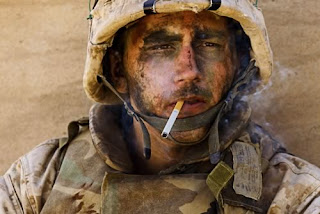
Rescue operation aims to save a wounded warrior
I picked up the Oregonian this morning and read the last story in this series about photographer Luis Sinco and his relationship with the marine in this now-famous photograph at left.
The story sucked me in and after reading the print version, I went online for the rest. (A critique of the Oregonian: Why not publish the link where readers can easily access the entire series? Why make me search on your website, then on the LA Times' to find what I'm looking for?)
Sinco's series was fascinating not just as an excellent in-depth story of one Marine's (Miller) post-combat struggles, but also as a first-person account of a journalist's relationship with his subject.
Sinco wrote: "A journalist wasn't supposed to get personally involved with his subjects. But I felt somehow responsible for Miller. Over and over, I thought: It will be my fault if something bad happens to him."
Reading statements like this in a newspaper kind of surprised me at first. I've never seen a story that uses this perspective. But it effectively brought me in and kept me reading, even online, which tends to be tremendously distracting. Is this the format stories will move toward as newspapers try harder to engage their readers? Traditionally, I would be opposed to that, favoring a continued effort toward third-person objectivity. But then again, it works, and there really is only one side to this story.
I also wonder about the impact of this story on other readers: do they sympathize with Sinco as well as Miller? People seem to have this jaded, negative attitude toward journalists, saying that they only care about what will cause a sensation or sell more papers. Obviously, this particular journalist cares very deeply about his subject. How does his experience fit in with their stereotypes?
The only thing that bothered me about this piece was that it ran in the same paper that included a story about a bomb in a marketplace in Baghdad killing 15 people and injuring 56 others. Yes, a disgraceful amount of American soldiers have died in this war. But their numbers are nothing compared to the amount of Iraqis killed by related terrorist acts. I understand that it is much more difficult to follow the story of an Iraqi affected by this violence, but it would make much more sense to do so from a human-tragedy standpoint. Miller, to some extent, had a choice about going to war. The people in the Baghdad bombing had violence brought to their doorstep without any say at all in the matter. Maybe we should start looking more closely at their stories too.




No comments:
Post a Comment